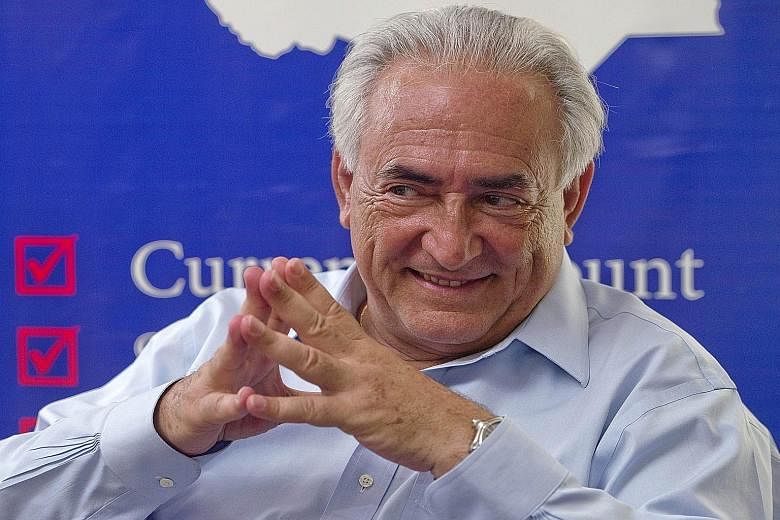Politicians in France never die; they just recycle themselves. That old French saying has never been truer than now as Mr Dominique Strauss-Kahn, the disgraced former head of the International Monetary Fund (IMF), looks poised to announce a return to French politics.
In many countries, the mere whiff of a sex scandal spells the end of a political career. Mr Strauss- Kahn, 66, experienced not one, but two major ones in recent years.
Yet, if recent opinion polls are to be believed, almost half of the French public believe DSK, as he likes to be called, would make a fine future president.
And recent signs suggest that he hopes to bank on such sentiments for a political comeback.
Certainly, Mr Strauss-Kahn's rise from Socialist MP in 1986 to minister of economics and finance within a decade was swift. His record is also remarkable: Defying party ideology, he privatised state-owned companies and presided over one of France's best economic growth rates in its post-war history.
Even though he failed to get his party's nomination for the 2007 presidential election, he gained a much higher prize. Mr Nicolas Sarkozy, the newly elected president, nominated him as France's candidate for the leadership of the IMF, largely in order to get rid of a powerful political rival.
The post did wonders for Mr Strauss-Kahn, who cast himself as Europe's saviour, and pushing the IMF into bailing Greece out of financial bankruptcy.
But then, disaster struck where it was always waiting to happen - in Mr Strauss-Kahn's private life. For decades, his amorous escapades had given him no trouble in France, where such matters are not usually considered fit for public comment.
However, even the French blanched when on May 14, 2011, Ms Nafissatou Diallo, a 32-year-old chambermaid working at the Sofitel hotel in New York, accused him of assaulting her as she entered his suite. Although the rape charge collapsed after questions about her truthfulness, he was ruled out of the 2012 presidential election.
Worse was to follow when he had to stand trial in France for pimping. Lurid details emerged of orgies during which several prostitutes accused Mr Strauss-Kahn of subjecting them to violent or humiliating sexual acts.
Again, he made no apologies for his "libertine" behaviour. He claimed he did not know the women were doing it for money; he had assumed they were just "attracted to a powerful man like me".
And again, he was acquitted, although everyone assumed that this episode surely put paid to any political aspirations.
Not so, for Mr Strauss-Kahn quickly found other ways of returning to the public eye. He consoled himself for the loss of Ms Ann Sinclair, a famous journalist who divorced him, by forming a liaison with Ms Myriam L'Auffir, a French TV press officer two decades his junior.
He also offered his services as an adviser to Serbia to help reschedule its debts. He secured seats on the boards of two Russian banks, and promptly started arguing against Western sanctions on Moscow. And he made frequent TV appearances criticising European leaders for their handling of the Greek economic crisis.
All these activities are clearly calculated to remind voters of his strongest point: economic competence. The shrewd campaign is backed up by feverish online activity: Mr Strauss-Kahn frequently posts articles on his political musings, written in a variety of European languages.
He is also a deft user of Twitter where he has more than 64,000 followers. It was the recent release of a cryptic English-language message "Hello Twitter, Jack is Back" which created a frenzy of speculation in France that he is about to return to full-time politics.
And for good reason, since President Francois Hollande is deeply unpopular and runs the risk of being eliminated in the first round of the next presidential election, due in 2017.
For now, Mr Hollande maintains a lofty silence about Mr Strauss- Kahn's reappearance. But Mr Jean-Christophe Cambadelis, chairman of the ruling Socialist party, has greeted the mere mention of DSK's name with a firm "Non"
However, other senior MPs are more ambivalent. "He can return to public life," said Mr Olivier Faure, the Socialists' deputy parliamentary leader, "yet without aspiring to become president of the republic".
A recent poll conducted by Liberation, a centre-left daily, has found that 37 per cent of voters consider him a "good candidate" for the presidential election. "The French like providential leaders; our history is full of returns of old convicts," explained Mr Francois Kalfon, another Socialist deputy.
Mr Strauss-Kahn will have a fight on his hands - Prime Minister Manuel Valls is more popular than any other candidate on the left. However, with more than a year to run before the election campaign begins, Mr Valls' popularity may sink, while Mr Strauss-Kahn's can only improve.
And he may also calculate that even if he fails to get nominated, he is likely to be offered an important party slot, just to keep him quiet.
Mr Philippe Moreau Chevrolet, who runs an opinion polling agency, has cautioned that despite recent positive omens, Mr Strauss- Kahn's popularity with women "is not that strong".
Not that that has ever bothered Mr Strauss-Kahn.

